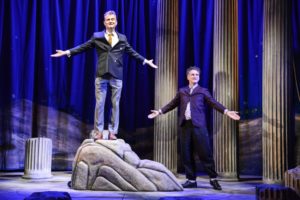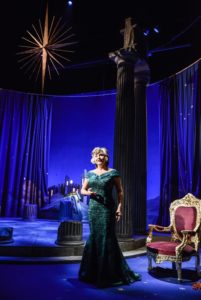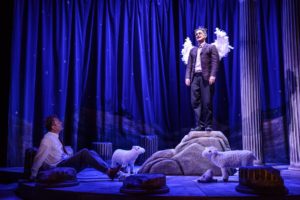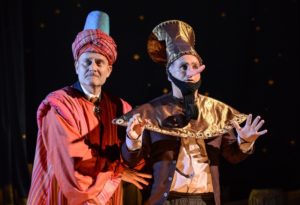It’s nigh-impossible to read the title of the newest play by The 39 Steps scribe Patrick Barlow without calling to mind that most iconic of Monty Python one liners – and Life of Brian is definitely an influence on this comedy about a hapless theatre troupe putting on a shambolic production of the greatest story ever told. Whilst it doesn’t reach the comedic heights of Cleese & co. arguing about what the Romans ever did for us, it manages to be a triffic trip through theatre tropes nonetheless.
Hugh Dennis is entertainingly harried and haranguing as Maurice Rose, an actor admirably fighting to stage his dream production despite diminishing resources and will to live. Although the play constrains Dennis’ natural flair for improvisation by trapping him in a rather fruitless ‘straight man’ role, he gamely leads the increasingly (and intentionally) chaotic performance of the Nativity story with deadpan wit and a sort of hangdog brio that grounds the action even as the humour gets curiouser and curiouser.
John Marquez as Ronald Bream is a revelation; he gives a 5-star performance in a play that desperately needs but doesn’t quite deserve him. Part Charlie Chaplin, part Michael Crawford, with a bit of ‘Allo ‘Allo’s Officer Crabtree thrown in for good measure, Marquez owns the stage in every word, gesture and intonation. His delivery alone makes a so-so line sensational, and there was very little he did which didn’t result in hysterics from the audience – his lovably oblivious mispronunciation of words in particular had us all in stitches. But the crowning glory of his performance is a Terry Jones-esque rendition of Mary, and his bickering with Dennis’ somewhat browbeaten Joseph is worth the price of admission alone.
Lesley Garrett rounds out the trio as diva Leonora Fflyte aka Mrs F, bringing glitz, glamour and a truly beautiful voice – but is ultimately wasted in a thankless, tangential role. Although she performs stunning renditions of Silent Night and In the Bleak Midwinter, her character adds nothing to the plot in a play which could have easily been a two-hander. Given the purposefully scrappy nature of the comedy, it would have worked better with the theme if Lesley Garrett played an opera singer who couldn’t sing (after all, it takes an excellent musician to portray a bad one – as Les Dawson proved some years ago). And it would have been more interesting if Mrs F was Maurice’s much-discussed ex, making their professional dynamic fraught with interpersonal tension.
The play is consistently entertaining – when it’s funny, it’s hilarious; but when it’s not, it really shows – and there are a few standout scenes which elevated the action: an atmospheric recreation of the Three Wise Men following the star had an otherworldly magic to it, and their subsequent flight from Herod had a sense of genuine urgency and thrill to it. This was especially noticeable in a play which had little drive throughout, and a perceptible lull in the second act – though they made up for it with a hilarious re-enactment of Jesus’ birth involving a lengthy Call the Midwife homage.
And the set is absolutely gorgeous: a dilapidated circle of Ancient Roman columns rotates dramatically when the drama requires, framed by a luxurious lapis lazuli curtain decorated to look like the starry night sky. The title ‘THE MESSIAH’, picked out in gold on a blood red cloth, is held aloft by two medieval angels that look as if they’d been airlifted straight out of The Book of Hours. And the ambience is aided by some neat lighting and smoke effects, plus a cool little light-up Bethlehem (complete with stable) and a rather grand heavenly star (the celestial kind) that swings in imperiously when needed. I’m not usually a fan of piped music in theatre productions, but this is one of the few exceptions: they chose absolutely brilliant scores that underlined and enhanced the emotions in any scene, from the Ben Hur/ The Ten Commandments-style epic orchestral numbers, to the excellent use of Wojciech Kilar’s sumptuous score from Bram Stoker’s Dracula).
Although the play sells itself on its comedically haphazard tone, there were some odd things about the production that made me question its intentions. The doors didn’t even open until about 5 minutes before the curtain was due to rise, and even when everyone was settled in the auditorium, the play still started late. Instead of making up time after Act 1, the interval also ran over, making us wait to see a second act which ultimately felt overlong in execution. The fair bit of audience participation (which I object to on principle) is all in good fun as long as you’re not in an aisle seat – though attempts to recreate an ‘I do believe in fairies’ moment and pass the farce off as a ‘spiritual discovery’ feel forced.
And finally… there’s a truly great play hiding within this; cut the interval and the superfluous stuff and make it one single act played straight through (which was a great move in Mischief Movie Night), make it a two-hander or develop Lesley’s character and give her more to do. As presented, it’s a production with a bit of an identity crisis, with little clarity as to what it wanted to be or say. Murder for Two and The 39 Steps deconstructed theatre in clever, inventive ways, but in this it feels as if the theatre symbolically (and occasionally literally) is falling down around them. It’s not the Messiah, it’s a very messy play.





